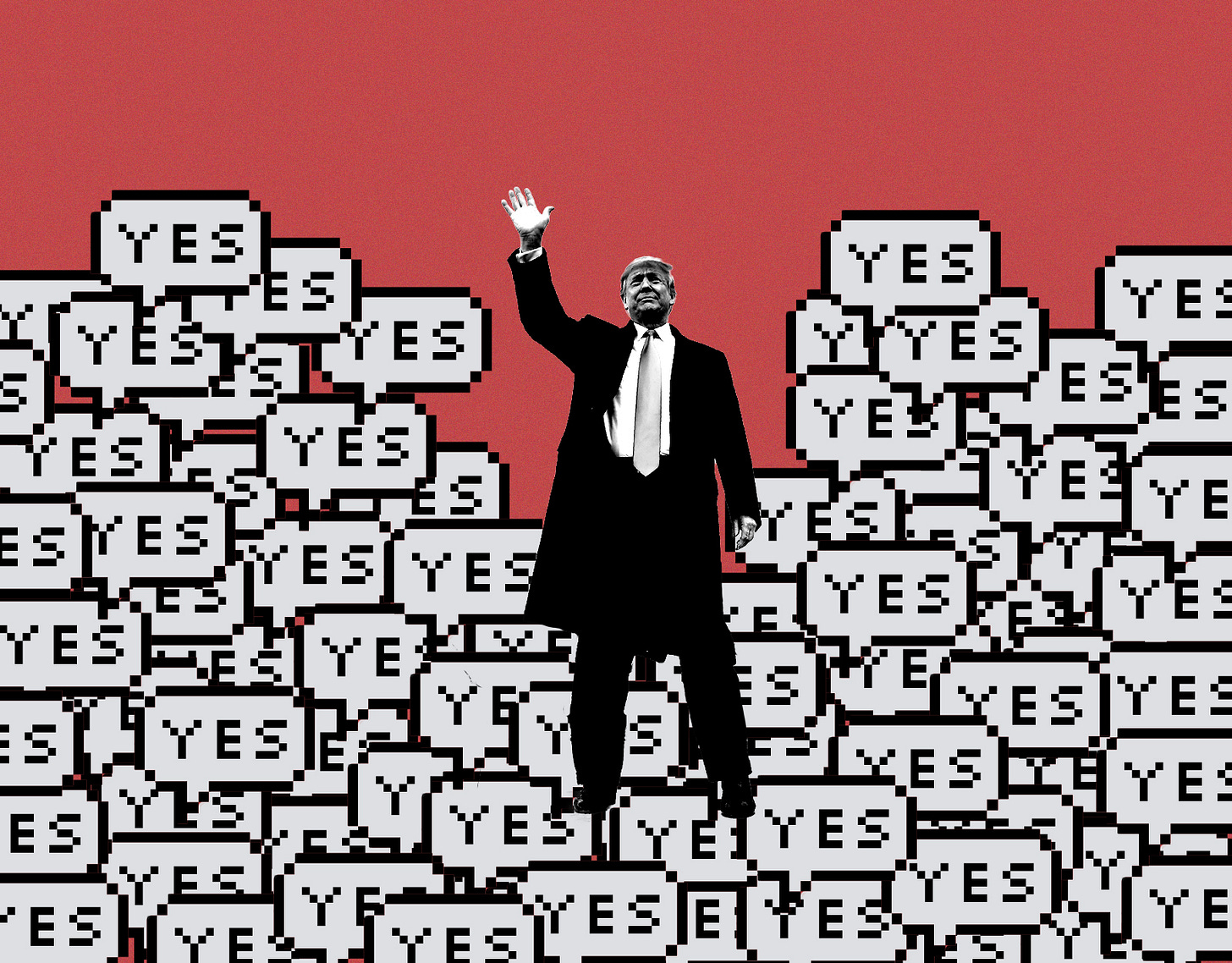Trump and His Yes-Men
Like an autocratic ruler, the president likes to be surrounded by people who never say no.
It ain’t easy leading a free country. You get criticized by the opposition party or parties. You face scrutiny from reporters and near-constant attack from the opinion press. Your political allies keep an eye on the exit. And your political fortunes are contingent upon your staying in the good graces of voters.
As vexing as all of this can be—and as tempting as it can be to restrict freedoms and rights, especially during times of crisis—the leaders of liberal democracies are, at least in some important respects, strengthened by being constantly challenged, rebuked, and told that they are wrong. If news is bad, it will not be suppressed to keep them happy. Lincoln famously drew on the wisdom of his “team of rivals.” During World War II, Churchill broke into tears on multiple occasions in arguments with his military leaders. (These and several other examples are featured in Andrew Roberts’s new book Leadership in War, which I recently reviewed for Law & Liberty.)
By contrast, autocrats tend to be surrounded by yes-men, and so they miss out on news and views that could improve their understanding and their options. While Adolf Hitler was apparently a voracious consumer of information, he at times ignored intelligence reports whose tidings he disagreed with. He said that he didn’t want his judgment to be clouded—by facts! And, as one scholar put it, he was “frequently hampered in his decision-making by sycophants who selected specific information that they believed he wanted to hear.” And can you imagine being Stalin’s subordinate and having to deliver him bad news—or worse, questioning his judgment? Enjoy your permanent vacation in Siberia!
“The foreign intelligence agencies of authoritarian regimes . . . act as mechanisms for reinforcing the regimes’ misconceptions of the outside world,” writes historian Christopher Andrew. By contrast, “a British intelligence chief once defined his main role as ‘telling the Prime Minister what the Prime Minister does not want to know.’” That principle can be extended from intelligence to other realms of advice and counsel.
Because leaders of liberal democracies are constantly challenged, they can learn their blind spots, their misjudgments can be caught and corrected, and the shortcomings of their strategies can be revealed and repaired. This makes them less prone than autocrats to making catastrophic mistakes. The world today might look very different if somebody had been in a position to advise a heedful Hitler that a land invasion of Russia is not the best idea.
Donald Trump is an autocrat-wannabe in a liberal regime. Although his cabinet and the ranks of his senior advisers have included some men and women of integrity, he is surrounded by a greater number of yes-men and grifters. Worse still are his political advisers and campaign operatives. At least Mike Pompeo—whom I’m no fan of—still cares to some extent about the future of the country. Brad Parscale’s and Kellyanne Conway’s jobs are not directly related to our national security, economic wellbeing, or public health, but just to propping up the president. Still, even though the stakes are lower, they apparently don’t tell Trump that he is wrong in his political judgment.
Parscale is not an idiot. None of Trump’s political advisers is. Conway and Mark Meadows are not new to this. They knew that planning a big Trump rally in the midst of a pandemic could create any number of potential problems, including a failure to fill a large arena. They certainly knew that building up expectations for the June 20 rally in Tulsa, as Trump was doing in the weeks before, was politically risky. But they apparently did not object, because they couldn’t tell the great leader, always in need of affirmation, that he might be wrong on this one, or that he might not be as popular as he thinks he is, or that his base is not as enthusiastic about him as it is about remaining healthy.
And the Tulsa rally is not the exception in Trump world. It is the norm. His advisers learned long ago that they must let him make mistakes because there is no use trying to change his mind. They themselves make mistakes, knowingly, to please him—starting with Sean Spicer’s infamous, ridiculous, obvious lie on January 21, 2017 that Trump’s inauguration crowd was larger than Barack Obama’s. Kayleigh McEnany is a graduate of Harvard Law School. She knows that comparing Trump with Abraham Lincoln is as ridiculous as it gets. Trump’s advisers know that his crusade against face masks as a front in the culture wars probably cost him votes without gaining any, but they still joined that crusade.
They always let him go ahead with his foolish and self-sabotaging plans, just as advisers to autocrats have always preferred to affirm and reaffirm their bosses rather than getting fired (or shot).
One is tempted to say that Trump’s enablers are his worst enemies, but that is unfair. Trump is his own worst enemy. In having always to be right, he ends up often being very wrong. Trump’s insecure ego and his authoritarian character are, we now know, a bad match for our liberal democratic system of politics. They will also be to Joe Biden’s political advantage this election year.


